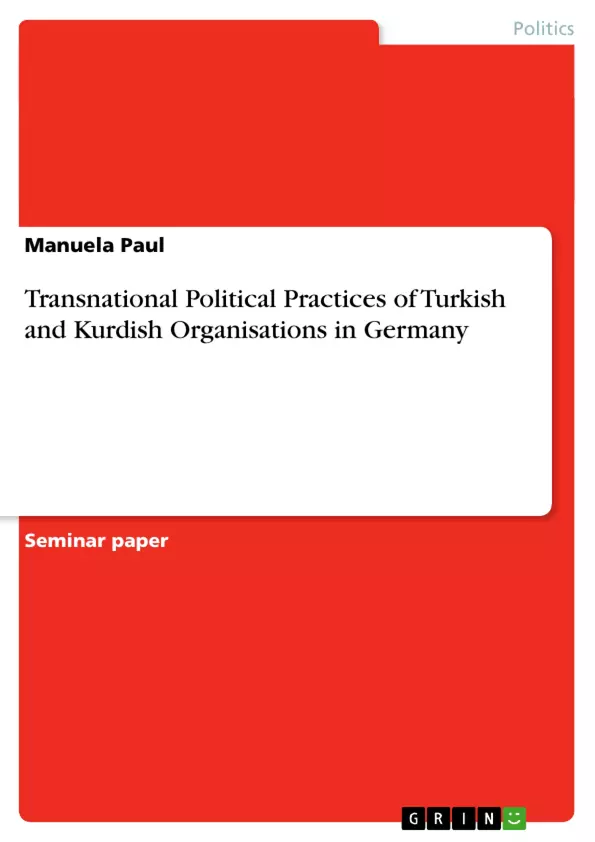[...] Since the beginning of Turkish and Kurdish immigrants arriving in Germany as so called guest workers in the 1960s, they have established multiple organisations ranging from totally apolitical associations to the ones with a political focus. The approximate number is estimated at about 1.500 Turkish and Kurdish organizations in the country (see Østergaard-Nielsen 2001, 270).
These organisations can be differentiated between having their focus on immigrant or homeland politics. Whereas immigrant problems on the agenda of an organisation involves politics to improve the situation in the receiving country, such as gaining political, economic and social rights, homeland politics imply the political connections of organisations maintained to the home country in order to affect the domestic or foreign policy (see Østergaard-Nielsen 2001, 262). Although since the 1970s there has been a certain shift from engagement in homeland politics to a stronger political involvement in immigration and German politics in general, Brady mentions that the attempt to influence Turkish politics among the immigrants might have actually increased (see Brady 2004, 49f.). Moreover, Ögelman states that most Turkish and Kurdish organizations in Germany have based their interests on homeland conflicts (see Ögelman 2003, 164). Against this background the paper focuses on the homeland attachments of Turkish and Kurdish political organizations in Germany. It aims to inquire about the forms of homeland ties established and furthermore discusses the reasons for migrants’ mobilisation and participation on homeland political issues. First, I will give an historical overview on the major stages of transnational politcs’ development since the beginning of labour recruitment from Turkey in the 1960s. Then I will go on to describe the transnational ties of Turkish organisations existing in Germany. Due to the high number and the diversity of Turkish organisations in Germany and the importance of the transnational space for the Kurdish movement (see Argun 2001, 125), this paper will particularly focus on the establishment and the ties of Kurdish organisations in Germany. In the third part of this paper I outline the reasons for the establishment of these connections considering Turkey’s and Germany’s influence.
Inhaltsverzeichnis (Table of Contents)
- 1. Introduction
- 2. Transnational Practices and Their Development in Germany
- 3. Connections to Home
- 4. Factors Promoting Transnational Ties
Zielsetzung und Themenschwerpunkte (Objectives and Key Themes)
This paper examines the homeland attachments of Turkish and Kurdish political organizations in Germany, investigating the forms of these ties and the reasons for migrant mobilization and participation in homeland political issues. It provides a historical overview of transnational politics' development since the arrival of Turkish guest workers in the 1960s, focusing on the establishment and ties of Kurdish organizations in Germany due to their significant presence and the importance of transnational space for the Kurdish movement.
- The development of transnational political practices among Turkish and Kurdish organizations in Germany.
- The nature of connections maintained by these organizations to their home country.
- Factors influencing migrants' involvement in homeland political issues.
- The shift in organizational focus from homeland to immigrant politics.
- The role of ethnic and religious identities in shaping organizational agendas.
Zusammenfassung der Kapitel (Chapter Summaries)
Chapter 1: Introduction introduces the context of Turkish and Kurdish migration to Germany and the political involvement of these communities. It highlights the experiences of Cem Özdemir, a German politician of Turkish descent, to illustrate the complexities of identity and political representation. The chapter establishes the study's focus on homeland ties of Turkish and Kurdish organizations and outlines the paper's structure.
Chapter 2: Transnational Practices and Their Development in Germany defines transnationalism and traces the development of transnational political practices of Turkish and Kurdish organizations in Germany from the 1960s onwards. It notes the initial lack of political organization among guest workers, followed by increasing involvement in both homeland and immigrant politics, influenced by events in Turkey and the changing perceptions of migrants' long-term residency in Germany.
Chapter 3: Connections to Home (This chapter summary is not included because there is no content provided.)
Chapter 4: Factors Promoting Transnational Ties (This chapter summary is not included because there is no content provided.)
Schlüsselwörter (Keywords)
Transnationalism, Turkish Politics, Kurdish Politics, Migration, Germany, Political Organizations, Diaspora Politics, Homeland Ties, Immigrant Integration, Ethnic Identity, Guest Workers.
Frequently Asked Questions
How many Turkish and Kurdish organizations exist in Germany?
Estimates suggest there are approximately 1,500 Turkish and Kurdish organizations in Germany, ranging from social clubs to highly political groups.
What is the difference between immigrant and homeland politics?
Immigrant politics focuses on rights and integration in Germany, while homeland politics involves maintaining ties to affect domestic or foreign policy in the home country.
Why is the focus on Kurdish organizations significant?
The "transnational space" is crucial for the Kurdish movement to organize and maintain identity across national borders, especially due to their history in Turkey.
How has political involvement changed since the 1960s?
While there was initially little organization, there has been a shift toward German politics, though interest in influencing Turkish politics remains high or has even increased.
What factors promote transnational ties?
Factors include political events in Turkey, the legal status of migrants in Germany, and the role of ethnic and religious identities.
- Quote paper
- Manuela Paul (Author), 2008, Transnational Political Practices of Turkish and Kurdish Organisations in Germany , Munich, GRIN Verlag, https://www.grin.com/document/123211



